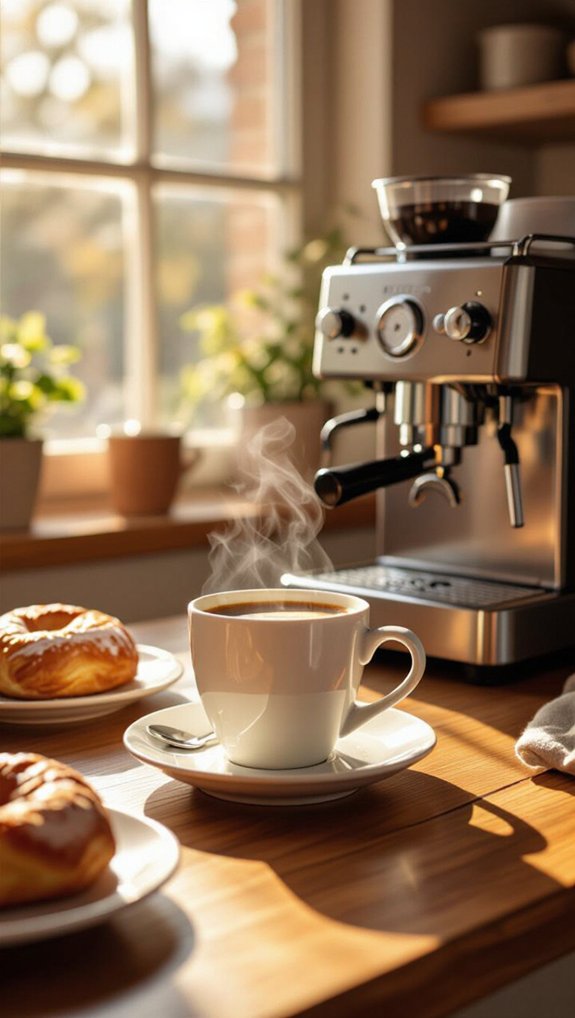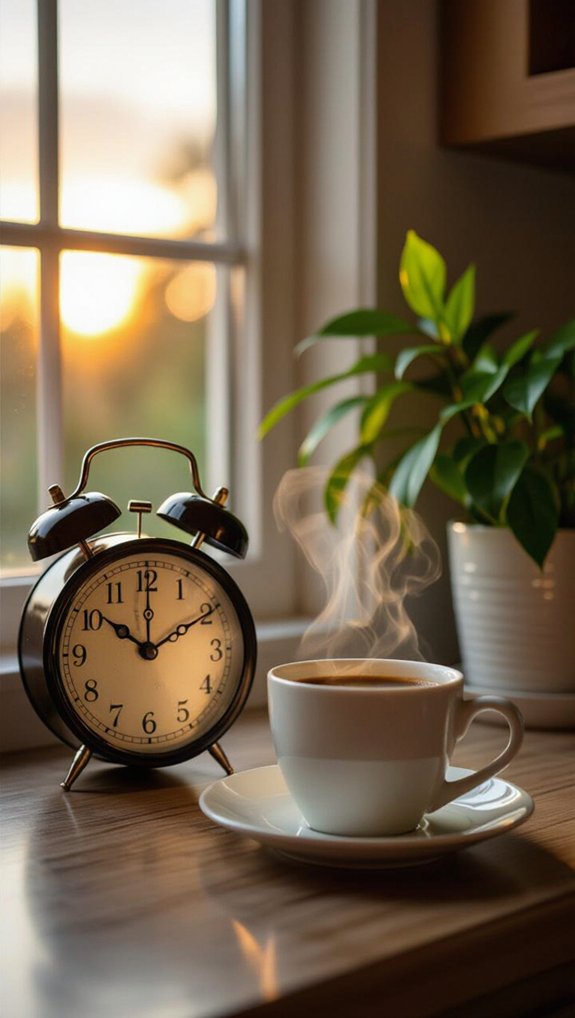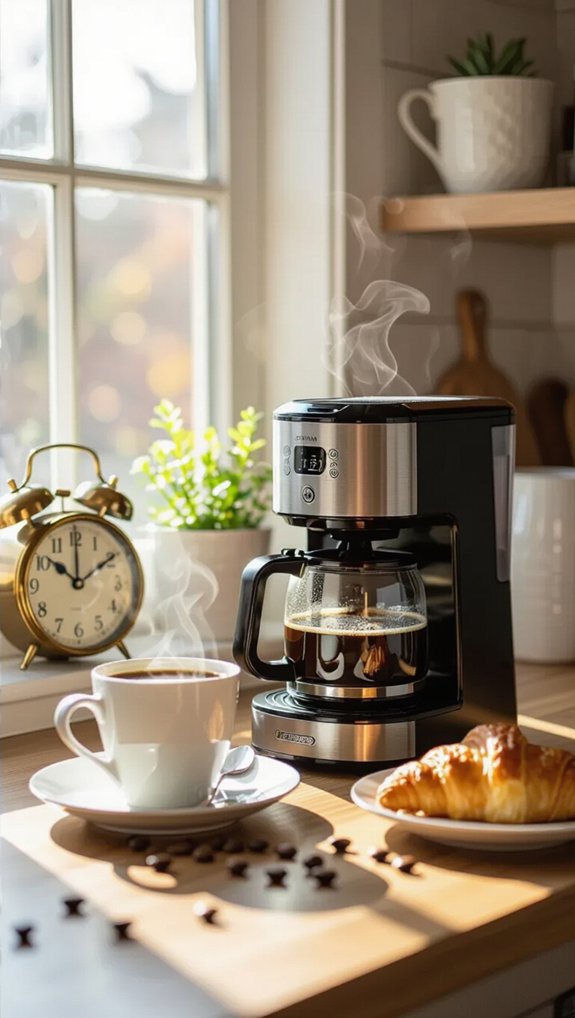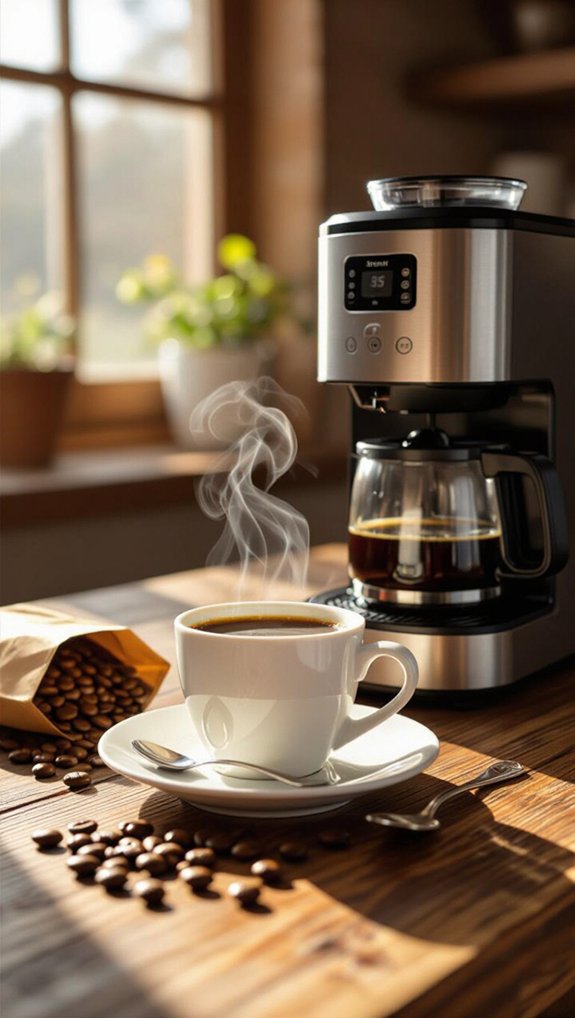Ever wondered when you should actually drink your coffee for maximum effectiveness? Most people reach for their morning cup the second they wake up, but this timing might not be giving you the energy boost you’re hoping for. Your body’s natural cortisol production and circadian rhythms play a crucial role in how caffeine affects your system.
The truth is, there’s a science behind optimal coffee timing that goes beyond personal preference. From understanding your body’s natural energy cycles to considering your specific goals – whether that’s enhanced workout performance, sustained focus, or avoiding afternoon crashes – the “when” matters just as much as the “what” when it comes to your daily brew.
In this post, we’ll explore the research-backed strategies for timing your coffee intake throughout the day. You’ll discover how to align your caffeine consumption with your body’s natural rhythms, avoid common timing mistakes that can disrupt your sleep, and create a personalized coffee schedule that maximizes both energy and productivity.
Table of Contents
Best Time to Enjoy Your Coffee Cup

Let’s explore the perfect moments to savor your coffee throughout the day, starting with that essential morning energy boost when you’re looking to kickstart your productivity.
If you’re like most coffee lovers, you’ll find the mid-morning hours (around 9:30–11:30 a.m.) offer the sweet spot for enjoying your cup, when your cortisol levels have dipped and caffeine can work its magic most effectively.
For those needing an afternoon pick-me-up, a carefully timed coffee can help you power through the post-lunch slump without disrupting your evening sleep patterns.
Morning energy boost
Most coffee enthusiasts quickly discover that timing their morning caffeine intake can dramatically enhance energy and performance. Your morning cup of coffee’s effectiveness depends on grasping cortisol rhythms and peak caffeine effects. Strategically drinking coffee mid- to late-morning (around 9:30–11:30 a.m.) delivers a powerful energy boost when natural alertness hormones dip.
Key morning coffee insights:
- Maximize workout performance by consuming caffeine 30–60 minutes pre-exercise
- Protect sleep by limiting caffeine intake 6–8 hours before bedtime
- Balance blood sugar by eating protein before your morning coffee
Precise timing transforms your daily brew from routine to remarkable.
Mid-morning sweet spot
After grasping how cortisol impacts morning energy, coffee lovers can unlock an even more strategic approach to their daily brew.
The mid-morning sweet spot-roughly 9:30–11:30 a.m.-offers the perfect timing to enjoy your cup of coffee. By delaying your morning coffee, you’ll find that the 92–100 mg of caffeine hits differently when cortisol levels have naturally declined. This means a more effective boost without unnecessary jitteriness.
Individual variability in caffeine metabolism plays a role, so pay attention to how your body responds.
Quick tip: pair your mid-morning coffee with a protein-rich snack to help moderate blood sugar and enhance your coffee experience.
Afternoon pick-me-up
Many coffee enthusiasts strategically time their afternoon coffee to combat the notorious post-lunch energy slump. Between 2–3 p.m., you’ll find the perfect window for a caffeine boost that combats the mid-afternoon dip and enhances peak alertness.
- Energize your workout by drinking coffee 30-60 minutes before exercise
- Prevent sleep disruption by cutting off caffeine 6-8 hours before bedtime
- Stay within the 400 mg daily limit to avoid jitteriness and anxiety
If traditional coffee feels too intense, consider decaf or green tea for a gentler afternoon pick-me-up that supports your energy and performance goals.
How Coffee Timing Affects Your Body

When you’re wondering about coffee’s impact on your body, timing is everything.
You’ll find that caffeine interacts with your natural cortisol rhythms and can significantly influence your alertness and sleep patterns. From managing your morning energy to grasping how a late-afternoon espresso might disrupt your night’s rest, the science behind coffee timing reveals fascinating insights into how this beloved beverage affects your physiological responses.
Cortisol and alertness
If you’re wondering why your morning coffee doesn’t always hit the same way, cortisol might be the culprit. This alertness hormone naturally peaks about 30-45 minutes after waking, creating a wake-up cortisol rhythm that can interfere with caffeine timing.
- Drinking coffee during morning cortisol peaks might reduce your perceived energy boost
- Mid-morning coffee (around 9:30-11:30 a.m.) can provide a more potent caffeine effect
- Consistent caffeine consumption can lead to cortisol suppression and potential tolerance
Understanding your body’s cortisol rhythm helps optimize coffee consumption, preventing overlap with natural alertness cycles and maximizing your caffeine experience.
Sleep and caffeine
Because sleep quality dramatically impacts our daily performance, grasping how coffee timing influences rest becomes crucial for coffee enthusiasts. Your caffeine habits can significantly affect sleep onset latency and overall rest quality.
| Caffeine Timing | Sleep Impact | Recommendation |
|---|---|---|
| Before Bed | Disrupted Sleep | Avoid |
| Late Afternoon | Potential Interference | Limit |
| Mid-Morning | Optimal | Recommended |
| Individual Variation | Depends on Genetics | Test Personally |
Understanding your CYP1A2 genetics and personal caffeine sensitivity helps optimize coffee consumption. Delay morning coffee past the cortisol peak, and establish a bedtime caffeine cutoff around mid-afternoon to minimize daytime sleepiness and ensure restful nights.
Coffee and Your Daily Routine

When it comes to coffee timing, you’ll want to consider whether to sip before or after breakfast and how caffeine can impact your workout performance.
I’ve found that the sweet spot for morning coffee is usually between 9:30 and 11:30 a.m., when your body’s natural cortisol levels have settled and caffeine can provide a clear, focused boost.
If you’re looking to enhance your exercise routine, timing your coffee about 30-60 minutes before working out can help optimize your performance and energy levels.
Before breakfast or after?
Since the timing of your morning coffee can significantly impact your energy levels and overall well-being, coffee lovers often wonder whether to enjoy their brew before or after breakfast. The best time to drink coffee depends on several factors like caffeine sensitivity, glucose tolerance, and morning cortisol levels.
Key considerations for coffee timing include:
- Potential glucose disruption when drinking coffee before eating
- Risk of jitteriness on an empty stomach
- Performance benefits of pre-workout caffeine
For most people, waiting 30-60 minutes after waking and pairing coffee with a protein-rich breakfast helps optimize energy and minimize potential negative effects.
Pre-workout performance
Maximize your workout potential by strategically timing your coffee intake to boost athletic performance. Pre-workout caffeine can be a game-changer when consumed 30–60 minutes before exercise, targeting peak blood caffeine levels. Aim for 3–6 mg/kg body weight-roughly 2–4 cups-to delay fatigue and enhance endurance and strength. Try “proffee” by mixing protein with your coffee for added benefits and satiety. Just be mindful of caffeine sensitivity and avoid intake 6–8 hours before bedtime to prevent sleep disruption. Your morning brew might just become your secret workout weapon.
Tips for Avoiding Coffee Sleep Disruption

Because caffeine can seriously disrupt your sleep patterns, grasping how to time your coffee consumption is crucial for maintaining healthy rest. The best time to drink coffee requires strategic planning to avoid caffeine before bed and minimize sleep onset latency.
- Limit your daily intake to 400 mg (about four 8-oz cups)
- Stop caffeine 6 hours before bedtime to respect your body’s caffeine half-life
- Consider decaf alternatives if you’re sensitive to evening caffeine
If you struggle with insomnia or want to improve sleep quality, move your last cup earlier and be mindful of your individual caffeine sensitivity.
How Much Coffee Is Just Right Daily

Finding the perfect daily coffee intake isn’t a one-size-fits-all endeavor, but you’ll discover clear guidelines that help optimize your caffeine consumption.
Most healthy adults can safely enjoy up to 400 mg of caffeine daily-about four 8-oz cups of coffee. Pregnant individuals should stick to 200 mg or less. Remember to track total caffeine from all sources like tea, energy drinks, and chocolate. Habitual coffee drinkers develop tolerance, so they might need more for the same alerting effect. For exercise performance, aim for 3–6 mg of caffeine per kilogram of body weight.
Choosing the Right Coffee for Any Time

When you’re navigating the world of coffee, timing and selection can dramatically impact your energy, mood, and overall experience. Your caffeine timing matters-mid-morning’s the sweet spot when cortisol dips.
I recommend:
- Brew a regular coffee 30-60 minutes pre-workout for an energy boost
- Choose green tea for smoother alertness with less jitteriness
- Select decaf options in late afternoon to preserve sleep quality
Whether you’re managing blood sugar, preparing for pregnancy, or just seeking the perfect cup, grasping caffeine’s half-life and your body’s rhythms can transform your daily ritual. Your coffee, your wellness.
Frequently Asked Questions
Why Should You Wait 90 Minutes to Drink Coffee?
I wait 90 minutes after waking to drink coffee so my cortisol levels stabilize, ensuring the caffeine hits differently and provides a more noticeable energy boost without overwhelming my natural morning alertness.
What Time Is Healthiest for Coffee?
I recommend drinking coffee between 9:30–11:30 a.m. after your cortisol peaks. This timing maximizes caffeine’s effectiveness, supports your natural energy rhythm, and helps you avoid potential blood sugar disruptions from early morning consumption.
What’s the Healthiest Way to Drink Coffee?
I recommend drinking coffee after a protein-rich breakfast, limiting intake to 400 mg daily, consuming it 30-60 minutes before exercise, and avoiding caffeine 6-9 hours before bedtime to maximize health benefits and minimize potential side effects.
When to Drink Coffee for Weight Loss?
I recommend drinking coffee 30-60 minutes before exercise to boost fat oxidation and potentially reduce calorie intake. Aim for 3-6 mg of caffeine per kg of body weight, but stay under 400 mg daily.
In Conclusion
Your coffee journey isn’t about strict rules, but grasping your body’s rhythm. Whether you’re seeking a morning boost, pre-workout energy, or afternoon pick-me-up, timing is key. Listen to your body, experiment with different coffee windows, and find what works best for you. Just remember to cut off caffeine several hours before bed to ensure quality sleep and wake up ready to enjoy your next perfect cup.







